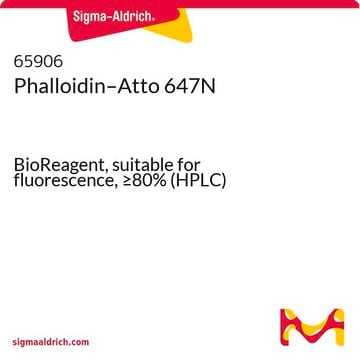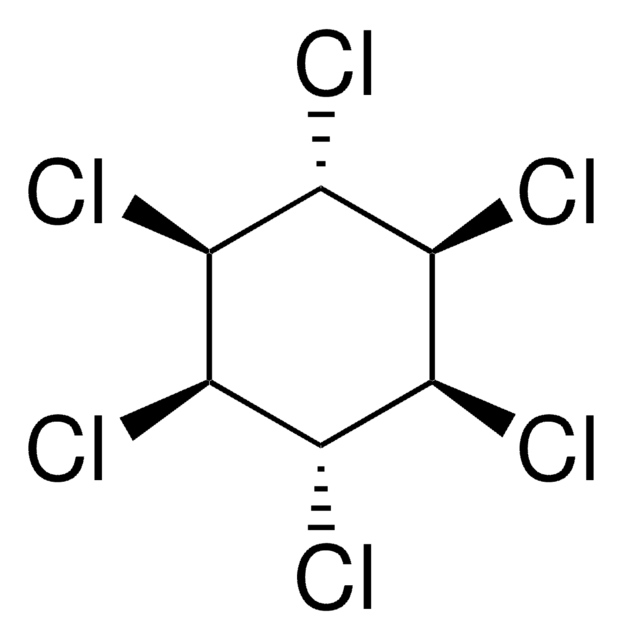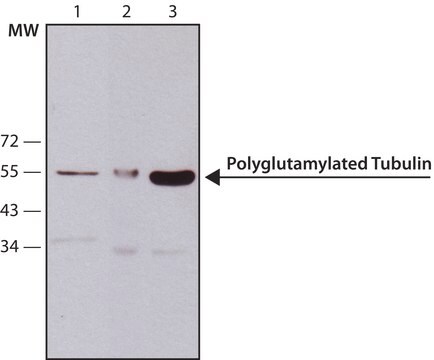68825
Phalloidin–Atto 633
suitable for fluorescence, ≥90% (HPLC)
Sign Into View Organizational & Contract Pricing
All Photos(1)
About This Item
UNSPSC Code:
12352108
NACRES:
NA.32
Recommended Products
Quality Level
Assay
≥90% (HPLC)
form
solid
mol wt
Mw 1434 g/mol
manufacturer/tradename
ATTO-TEC GmbH
λ
in methanol
UV absorption
λ: 629-635 nm Amax
suitability
suitable for fluorescence
storage temp.
−20°C
General description
Atto 633 belongs to a new generation of fluorescent labels for the red spectral region. The dye is designed for application in the area of life science, e.g. labelling of DNA, RNA or proteins. Characteristic features of the label are strong absorption, high fluorescence quantum yield, high photostability, good water solubility, and very little triplet formation. Atto 633 is a cationic dye. After coupling to a substrate the dye carries a net electrical charge of +1. In common with most Atto-labels, absorption and fluorescence are independent of pH, at least in the range of pH 2 to 11, used in typical applications.
Phalloidin is a fungal toxin isolated from the poisonous mushroom Amanita phalloides. Its toxicity is attributed to the ability to bind F actin in liver and muscle cells. As a result of binding phalloidin, actin filaments become strongly stabilized. Phalloidin has been found to bind only to polymeric and oligomeric forms of actin, and not to monomeric actin. The dissociation constant of the actin-phalloidin complex has been determined to be on the order of 3 x 10-8. Phalloidin differs from amanitin in rapidity of action; at high dose levels, death of mice or rats occurs within 1 or 2 hours. Fluorescent conjugates of phalloidin are used to label actin filaments for histological applications. Some structural features of phalloidin are required for the binding to actin. However, the side chain of amino acid 7 (g-d-dihydroxyleucine) is accessible for chemical modifications without appreciable loss of affinity for actin.
find more information here
Phalloidin is a fungal toxin isolated from the poisonous mushroom Amanita phalloides. Its toxicity is attributed to the ability to bind F actin in liver and muscle cells. As a result of binding phalloidin, actin filaments become strongly stabilized. Phalloidin has been found to bind only to polymeric and oligomeric forms of actin, and not to monomeric actin. The dissociation constant of the actin-phalloidin complex has been determined to be on the order of 3 x 10-8. Phalloidin differs from amanitin in rapidity of action; at high dose levels, death of mice or rats occurs within 1 or 2 hours. Fluorescent conjugates of phalloidin are used to label actin filaments for histological applications. Some structural features of phalloidin are required for the binding to actin. However, the side chain of amino acid 7 (g-d-dihydroxyleucine) is accessible for chemical modifications without appreciable loss of affinity for actin.
find more information here
Legal Information
This product is for Research use only. In case of intended commercialization, please contact the IP-holder (ATTO-TEC GmbH, Germany) for licensing.
Storage Class Code
11 - Combustible Solids
WGK
WGK 3
Flash Point(F)
Not applicable
Flash Point(C)
Not applicable
Certificates of Analysis (COA)
Search for Certificates of Analysis (COA) by entering the products Lot/Batch Number. Lot and Batch Numbers can be found on a product’s label following the words ‘Lot’ or ‘Batch’.
Already Own This Product?
Find documentation for the products that you have recently purchased in the Document Library.
Customers Also Viewed
Heather M Weber et al.
Acta biomaterialia, 57, 59-69 (2017-05-21)
Dialysis or kidney transplantation is the only therapeutic option for end stage renal disease. Accordingly, there is a large unmet clinical need for new causative therapeutic treatments. Obtaining robust models that mimic the complex nature of the human kidney is
Krishna Chander Sridhar et al.
Cell communication and signaling : CCS, 18(1), 191-191 (2020-12-30)
The electromechanical function of myocardial tissue depends on the intercellular communication between cardiomyocytes (CMs) as well as their crosstalk with other cell types. Cell injury, and subsequent death trigger inflammation as in myocardial infarction (MI) resulting in myocardial remodeling. Although
Danielle Park et al.
Nature materials, 19(2), 227-238 (2019-10-30)
The isotropic or anisotropic organization of biological extracellular matrices has important consequences for tissue function. We study emergent anisotropy using fibroblasts that generate varying degrees of matrix alignment from uniform starting conditions. This reveals that the early migratory paths of
Esther N Arwert et al.
Nature cell biology, 22(7), 758-766 (2020-06-03)
Cancer-associated fibroblasts (CAFs) perform diverse roles and can modulate therapy responses1. The inflammatory environment within tumours also influences responses to many therapies, including the efficacy of oncolytic viruses2; however, the role of CAFs in this context remains unclear. Furthermore, little
Marco Montagner et al.
Nature cell biology, 22(3), 289-296 (2020-02-26)
The process of metastasis is complex1. In breast cancer, there are frequently long time intervals between cells leaving the primary tumour and growth of overt metastases2,3. Reasons for disease indolence and subsequent transition back to aggressive growth include interactions with
Our team of scientists has experience in all areas of research including Life Science, Material Science, Chemical Synthesis, Chromatography, Analytical and many others.
Contact Technical Service






